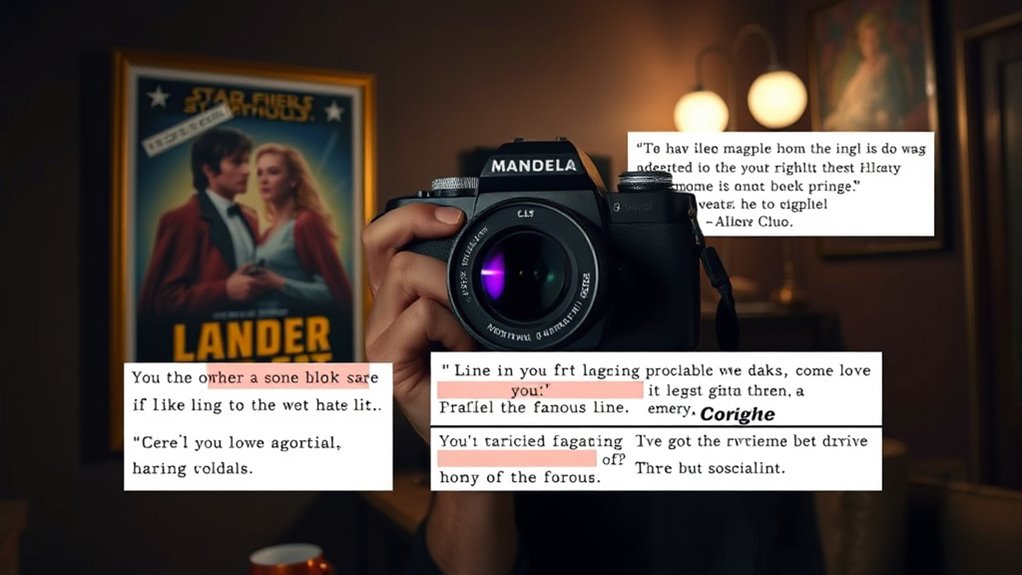The Mandela Effect causes many to misremember iconic movie quotes, making false memories feel just as real as the original lines. You might recall Darth Vader saying, “Luke, I am your father,” but the actual line is “No, I am your father.” These inaccuracies spread through shared stories, media, and repetition. Recognizing how collective false memories shape our perceptions is fascinating—if you want to see how these altered recollections form, keep exploring further.
Key Takeaways
- Many people incorrectly recall iconic movie lines, like “Luke, I am your father” from Star Wars, instead of the actual phrase.
- False memories are reinforced through media, conversations, and repeated sharing, making inaccurate quotes seem familiar.
- The mind often reconstructs quotes with slight variations, such as tense changes or omitted words, leading to collective misremembering.
- Recognizing these false recollections highlights how shared stories shape perceptions and influence collective memory.
- Verifying quotes against original sources can reveal the discrepancies caused by the Mandela Effect.

The Mandela Effect refers to a phenomenon where a large group of people remember an event, detail, or fact differently from how it actually occurred. When it comes to movie quotes, this effect often leads you to believe certain lines are iconic or have specific wording, only to discover you’ve remembered them incorrectly. These alternate memories can seem so vivid that they feel just as real as the actual quotes, but they’re often false recollections—mistaken memories that your brain has reconstructed over time.
Think about the famous line from “Star Wars”: many people swear Han Solo says, “Luke, I am your father,” when the real line is, “No, I am your father.” Your mind creates that version because it sounds more dramatic or familiar, but it’s not what was actually spoken. This is a classic example of how false recollections can distort what you remember. You might also recall Darth Vader’s line as “Luke, I am your father,” because it’s been repeated in pop culture so often that it feels like the original. These alternate memories are reinforced through media, conversations, and shared stories, making them feel authentic.
Many remember Han Solo’s line as Luke, I am your father, but the actual line is No, I am your father.
Another example involves the quote from “The Silence of the Lambs,” where many swear Hannibal Lecter said, “Hello, Clarice,” upon first meeting. In reality, he never says this line. Instead, he simply greets her with “Good evening.” Your brain may have filled in the missing words or created a memorable phrase because it sounds more impactful or fitting, but that’s just a false recollection. These misremembered quotes can spread because they’re easy to recall and share, further cementing the incorrect version in collective memory.
You might also think the line from “Forrest Gump” is “Life is like a box of chocolates,” but the actual quote is “Life was like a box of chocolates,” using the past tense. This subtle difference often gets blurred over time, as your mind reconstructs the quote based on how it sounds and feels. The power of memory plays a significant role in how these inaccuracies persist and spread. The same happens with many other famous lines, where the wording becomes distorted through repetition or misinterpretation.
In the end, these alternate memories and false recollections show how powerful your mind is at filling in gaps. They highlight how easy it is to remember things incorrectly, especially when they’re repeated or shared widely. Recognizing these inaccuracies helps you understand the true nature of the Mandela Effect—how collective false memories shape what you believe to be fact, even when they’re not.
Frequently Asked Questions
Why Do Some Memories Feel so Vivid yet Wrong?
You experience vivid yet incorrect memories because of memory distortion and cognitive biases. Your brain reconstructs events, often filling gaps with false details, making memories feel real. Confirmation bias leads you to remember things that fit your beliefs, while the misinformation effect alters what you recall. These processes cause your mind to hold onto compelling but inaccurate memories, making them seem as vivid as true experiences.
Can the Mandela Effect Affect Real-Life Decisions?
Yes, the Mandela Effect can influence your real-life decisions by causing memory distortion and perception gaps. When you remember certain details differently, you might make choices based on inaccurate beliefs or past experiences. This can lead to misunderstandings or mistakes, especially if you rely heavily on these flawed memories. Being aware of how perception gaps affect your recall helps you question your memories and make more informed decisions.
Are There Psychological Reasons Behind False Movie Quote Memories?
Yes, psychological reasons like memory construction and cognitive biases cause false movie quote memories. When you recall a quote, your brain reconstructs it based on fragments and expectations, often filling in gaps inaccurately. Cognitive biases, such as confirmation bias, make you more likely to remember quotes that fit your beliefs or stereotypes. These mental shortcuts distort your memory, leading you to recall incorrect or altered movie quotes over time.
How Common Is the Mandela Effect Across Different Cultures?
You’ll find the Mandela Effect is quite common across different cultures because shared misconceptions shape cultural memory. People from diverse backgrounds often recall similar false details, highlighting how collective beliefs influence memory. This phenomenon shows up in various societies, demonstrating that cultural memory can be distorted by misinformation or popular narratives. So, across cultures, the Mandela Effect reveals how easily our shared perceptions can be misled, impacting how memories are formed and remembered.
Could the Mandela Effect Suggest Alternate Realities?
Imagine your mind as a mirror reflecting parallel universes; the Mandela Effect might hint at memory distortion crossing into alternate realities. While science suggests these are tricks of perception, some believe they symbolize glimpses into hidden dimensions. You might see a quote you swear is from a different universe, sparking thoughts of parallel worlds blending. Though evidence remains elusive, it’s a fascinating idea that our memories could be windows to alternate realities.
Conclusion
Just like Pandora’s box, your memories can sometimes release surprises you never expected. The Mandela Effect reminds you that even the most familiar movie quotes might not be as etched in stone as you think. So, next time you recall a line with absolute certainty, remember it could be part of the illusion. Stay curious, question what you remember, and embrace the mystery—because sometimes, our minds are the greatest storytellers of all.










